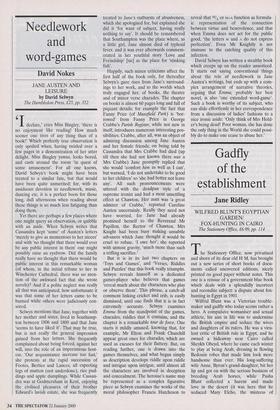Gadfly of the establishment
Jane Ridley
WILFRED BLUNT'S EGYPTIAN GARDEN/ FOX-HUNTING IN CAIRO The Stationery Office, £6.99, pp. 114 The Stationery Office, now privatised and shorn of its dear old H M, has brought out a new series of short books of docu- ments called uncovered editions, nicely printed on good paper without notes. This one is a reissue of a government blue book which deals with a splendidly incorrect and recondite subject: a dispute about fox- hunting in Egypt in 1901.
Wilfrid Blunt was a Victorian trouble- maker and gadfly who today seems rather a hero. A compulsive womaniser and sexual athlete, his aim in life was to undermine the British empire and seduce the wives and daughters of its rulers. He was a viru- lent critic of British rule in Egypt, and he owned a hideaway near Cairo called Sheykh Obeyd, where he came each winter to play at being Arab, dressing in flowing Bedouin robes that made him look more handsome than ever. His long-suffering wife Anne, Byron's grand-daughter, bit her lip and got on with the serious business of breeding Arab horses, while Pasha Blunt collected a harem and made love in the desert (it was here that he seduced Mary Elcho, the mistress of Arthur Balfour, in 1895).
In the summer of 1901 when Blunt was in England, some officers of the 11th Hus- sars led by Major Rycroft took their newly formed pack of fox-hounds to Sheykh Obeyd. The hounds jumped into the gar- den and found a fox. Two mounted officers followed the hounds into the enclosure, where they were set upon by Blunt's Arab servants, who beat them with sticks. Major Rycroft didn't allow his men to retaliate, but called the police, who arrested three of the servants. They were tried for assault, and sentenced to a few months' imprison- ment.
This was just the kind of opportunity Blunt relished. He huffed and he puffed, he bombarded the Foreign Office with lengthy letters complaining about the offi- cers' behaviour, he wrote to the papers, he got questions asked in parliament. His ser- vants, he said, were merely obeying orders to exclude trespassers, and he infuriated the officers by accusing them of cowardice in running away. Blunt wasn't anti-hunting — on the contrary, he was a keen fox- hunter; but he thought hunting in Egypt was childish. The documents printed here show how skilfully he used what was after all a very minor issue to needle the Foreign Office and broadcast the privileged posi- tion of Egypt's British rulers. Blunt insisted that in Egypt the law was unfairly skewed, and no native had a cat's chance in hell of a fair trial in a dispute with an English offi- cer. The moral victory was his — the ser- vants' sentences were reduced and the Foreign Office agreed to publish the corre- spondence in a blue book.
No one in Islington will buy this book, but it's an intriguing historical footnote. Congratulations to the Stationery Office for unearthing and reissuing such an enjoy- able vignette.



























































 Previous page
Previous page